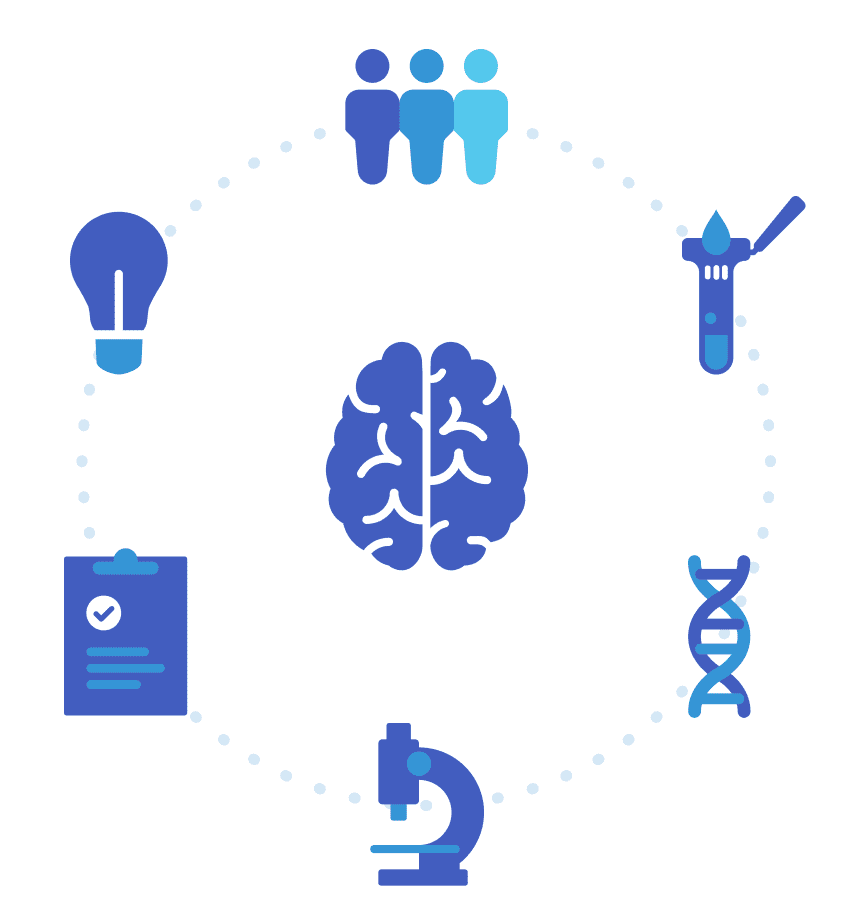By Keaton Stagaman*
It’s been noted at least since James Parkinson’s original essay describing the “shaking palsy” that some of the earliest symptoms of Parkinson’s disease (PD) involve the gut. So, 23andMe researchers, working in collaboration with The Michael J. Fox Foundation for Parkinson’s Research, are studying the microbiome of individuals with Parkinson’s disease to learn more about this “gut-brain axis” and what it can tell us about the disease.
This is the first time a single study with hundreds of people reporting Parkinson’s disease diagnosis who’ve consented to participate in this research have also included samples of both the gut and oral microbiomes.
The human body plays host to trillions of microbes—such as bacteria, archaea, and fungi— collectively called the microbiome. Over the past few decades, it has become abundantly clear to the scientific community that the microbiome plays an essential role in our development, physical health, and mental well-being. [1]

This latter connection, between our minds and our microbes, particularly in our digestive tracts, is part of our “gut-brain axis.” Many neurological diseases like Parkinson’s disease that affect our brain and behavior — often begin with digestive tract issues as the first sign.
23andMe Parkinson’s Research
23andMe has focused research efforts on Parkinson’s disease since 2009. Just under half of people diagnosed with Parkinson’s disease suffer from intestinal problems, such as constipation, and other more classical symptoms associated with the disease, such as tremors and slow movement.
While researchers have identified genes and environmental factors that may contribute to the risk, for those with Parkinson’s, the cause of their disease remains unknown. For several years, it has been thought that Parkinson’s might start in the gut. The hallmark of the disease is the buildup of misfolded protein (alpha-synuclein) deposits in nerve cells in the brain. One intriguing hypothesis is that this misfolding might start in the gastrointestinal tissue, and travel through the nervous system up to the brain. This, of course, opens the possibility that the gut microbiome might play a key role in the pathological onset of Parkinson’s disease.
The Microbiome
Most studies of the microbiome in people with Parkinson’s disease have been in small populations and so far have led to more questions than answers. In order to investigate what role the microbiome might play in the development of Parkinson’s disease, 23andMe embarked on a large microbiome study in collaboration with The Michael J. Fox Foundation for Parkinson’s Research (MJFF). Back in 2021, we invited over 650 23andMe customers, about two thirds of whom had reported being diagnosed with PD, to participate in the study by providing stool and saliva microbiome samples. To our knowledge, this is the largest single study to test the relationships between both the oral and gut microbiomes and Parkinson’s disease, providing us with the statistical power to uncover potentially important associations.
Participants’ samples were sequenced using a high-tech method called shotgun metagenomics, which allows us to identify not only which microbes are present in the microbiome, but genes that these microbes harbor. This gives us information of “who” is in the microbiome, and “what” they’re capable of doing. Additionally, the participants completed a deep dive survey of microbiome-related questions, such as their age, dietary habits, and biological sex. Customers with Parkinson’s also provided detailed information about their symptoms, treatment, disease milestone, and daily functioning.
A First
The primary goal is to identify signatures of Parkinson’s disease in the microbiome. That is, are there specific microbes or specific microbial genes that are more likely to be present in people with Parkinson’s disease regardless of their age, biological sex, diet, or symptoms? Furthermore, we can identify microbes or microbial genes that are associated with specific Parkinson’s symptoms, how fast their disease has progressed, and how severe their symptoms are.
This is the first time a single study of this size has sampled both the gut and oral microbiomes. In doing so, we can identify links between the microbes in our mouth and gut and how this might contribute to Parkinson’s disease. As sampling saliva is much less cumbersome than sampling stool, spit-based microbiome sampling could provide us with a much easier way to test for the presence of microbial Parkinson’s disease indicators in the future.
The study included 427 customers with Parkinson’s and 226 customers without PD between the ages of 50 and 69. The customers with Parkinson’s were diagnosed, on average, at the age of 59 years old. They reported typical motor symptoms of PD including shaking tremor (67%), slowness of movement (47%), stiffness (40%). Around one-third also reported suffering from constipation. Our microbiome can differ substantially according to where we live. The samples collected in the study were collected across all 50 states in the US, which will make the findings widely geographically applicable.
With such a large cohort that has been willing to provide us with so much helpful information, this is a one-of-a-kind opportunity to study the relationship between the microbiome and Parkinson’s disease. More than 6 million people worldwide have Parkinson’s disease. For 23andMe, this is an opportunity to move the needle on what role gut microbes may play in Parkinson’s disease, which could open up new opportunities for customers with PD in the future. We are grateful to our 23andMe customers that were willing to provide their samples. We hope this will raise awareness that Parkinson’s disease goes beyond problems with movement, such as tremor and slow movement, and actually affects many other organ systems, like the gut.
Future microbiome research
Beyond advancing Parkinson’s disease research, studying associations between the microbiome, human genetics, and disease could lead to greater insights into human health more broadly.
Because of this, 23andMe has recently expanded its ability to study the microbiome by adding oral microbiome data from stored saliva samples to the data types that 23andMe researchers may analyze under our Research Consent Document. By expanding the data types we can analyze to include the microbiome, we hope to power greater insights into human health and wellness.
You can read more about these updates here.
Citations
- Cho, I., Blaser, M. The human microbiome: at the interface of health and disease. Nat Rev Genet 13, 260–270 (2012). https://doi.org/10.1038/nrg3182
*Keaton Stagaman is a postdoctoral fellow at 23andMe, whose position is funded by MJFF. He has authored numerous original research papers and reviews on the microbiomes of vertebrates, including zebrafish, mice, and humans. In his previous position as a postdoc at Oregon State University, he focused his research on the gut-brain axis. In particular, he studied what role the gut microbiome plays in how environmental toxicants and neurodegenerative diseases affect animal behavior.




